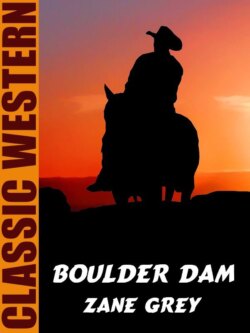Читать книгу Boulder Dam - Zane Grey - Страница 6
На сайте Литреса книга снята с продажи.
Prologue
ОглавлениеThat first upthrust of the slope of the western hemisphere formed a vast inland sea which gave birth to a rapacious and terrible river. Throughout the ages in its work of draining that immense area of water it cut wide and deep into the bowels of the earth.
Then after millions of years came the second upthrust. It added velocity and grinding power to this sinister and irresistible stream, and the inland sea shrank to a salty lake in the midst of a desolate wasteland. But the river flowed on in lessened volume, grim in its task, still mighty and insatiate, fed by the rains and snows from the mountain heights. It was a river of silt. It had teeth of sand. In the thousands of centuries that nature bent to this slow and inscrutable travail it gouged a dark canyon down to the black archaic rock, and there on the very floor of the earth crust, harder than iron and as enduring as the firmament, the great river thundered and ground in vain. It must wait for another cataclysm of the elements.
In time strange living creatures appeared out of the north and wandered into the branch canyons of the great chasm. They were little men, dark-visaged and slant-eyed, and they perished almost without leaving trace of their struggle. The cliff dwellers followed, building tiny houses of stone and cement that withstood the weathering processes of time long after a stronger race out of the south drove them over the precipices. And this race gave way to the Indians.
The Spaniards found savage redskinned tribes all over this arid region. And they guided Coronado and his armored followers to the brink of the abyss from the depths of which floated up the sullen roar of a mighty river.
Coronado was the first white man to gaze down into that awful red rent in the earth. The solid ground appeared divided, and there was no way across to the other side of the world. The scene was of such sublimity that the Spanish explorers stood spellbound. Nothing had ever been known of such a terrible place. Coronado could not at first accept the evidence of his own eyes.
A ragged rim of yellow limestone ran north and south. Grotesque cedar trees, with gnarled and bleached tops, reached out with clutching hands of dead men. Down sheered the precipitous cliffs, to merge into a zone of red, where strange plateaus and slopes, and mountains of naked rock, led the fearful gaze down into the purple and obscure depths of chaos. It was a ghastly exposure of the naked ribs and bowels of the rock-bound earth. But it had an appalling beauty. A million facets of red and orange and brown caught the sunlight in brilliance too strong for the gaze of man. The unknown depths were mantled in dim mystic purple. The far slopes sheered up with vast and tremendous sweep to a golden band crowded by a wandering fringe of black. Coronado named the abyss Grande Cañon del Rio Colorado.
White men as daring as the armor-clad Spaniards in due time explored the bottom of that canyon. Powell, with his intrepid band, ran the mysterious river in boats, a voyage that entailed terrible risk and hardship and loss of life. The red river of silt was a succession of dangerous rapids for two hundred and seventeen miles. Powell named them, and the intersecting gorges, and the superb peaks and domes as well as the differing reaches of the canyon.
In our modern day men even more daring than Coronado and Powell stood upon the black rim of the lower canyon and conceived an idea as strange and wild as any vague dawning thought of the cliff dwellers, or of the dreaming redskinned savage, an idea born of the progress of the world, as heroic and colossal as the inventive genius of engineers could conjure, as staggering and vain as the hopes of the builders of the pyramids, an idea that mounted irresistibly despite the mockery of an unconquerable nature—and it was to dam this ravaging river, to block and conserve its floods, to harness its incalculable power, to make it a tool of man.
